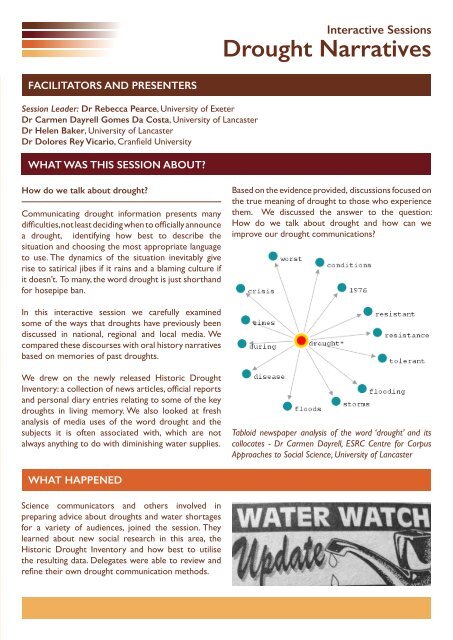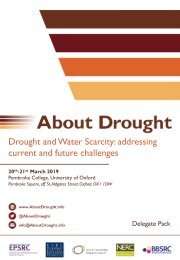About Drought Showcase Review (Post-Event)
You also want an ePaper? Increase the reach of your titles
YUMPU automatically turns print PDFs into web optimized ePapers that Google loves.
Interactive Sessions<br />
<strong>Drought</strong> Narratives<br />
FACILITATORS AND PRESENTERS<br />
Session Leader: Dr Rebecca Pearce, University of Exeter<br />
Dr Carmen Dayrell Gomes Da Costa, University of Lancaster<br />
Dr Helen Baker, University of Lancaster<br />
Dr Dolores Rey Vicario, Cranfield University<br />
WHAT WAS THIS SESSION ABOUT?<br />
How do we talk about drought?<br />
Communicating drought information presents many<br />
difficulties, not least deciding when to officially announce<br />
a drought, identifying how best to describe the<br />
situation and choosing the most appropriate language<br />
to use. The dynamics of the situation inevitably give<br />
rise to satirical jibes if it rains and a blaming culture if<br />
it doesn’t. To many, the word drought is just shorthand<br />
for hosepipe ban.<br />
Based on the evidence provided, discussions focused on<br />
the true meaning of drought to those who experience<br />
them. We discussed the answer to the question:<br />
How do we talk about drought and how can we<br />
improve our drought communications?<br />
In this interactive session we carefully examined<br />
some of the ways that droughts have previously been<br />
discussed in national, regional and local media. We<br />
compared these discourses with oral history narratives<br />
based on memories of past droughts.<br />
We drew on the newly released Historic <strong>Drought</strong><br />
Inventory: a collection of news articles, official reports<br />
and personal diary entries relating to some of the key<br />
droughts in living memory. We also looked at fresh<br />
analysis of media uses of the word drought and the<br />
subjects it is often associated with, which are not<br />
always anything to do with diminishing water supplies.<br />
Tabloid newspaper analysis of the word ‘drought’ and its<br />
collocates - Dr Carmen Dayrell, ESRC Centre for Corpus<br />
Approaches to Social Science, University of Lancaster<br />
WHAT HAPPENED<br />
Science communicators and others involved in<br />
preparing advice about droughts and water shortages<br />
for a variety of audiences, joined the session. They<br />
learned about new social research in this area, the<br />
Historic <strong>Drought</strong> Inventory and how best to utilise<br />
the resulting data. Delegates were able to review and<br />
refine their own drought communication methods.<br />
131



